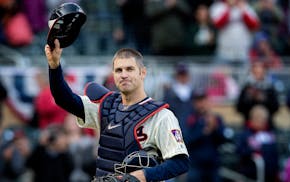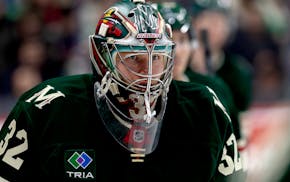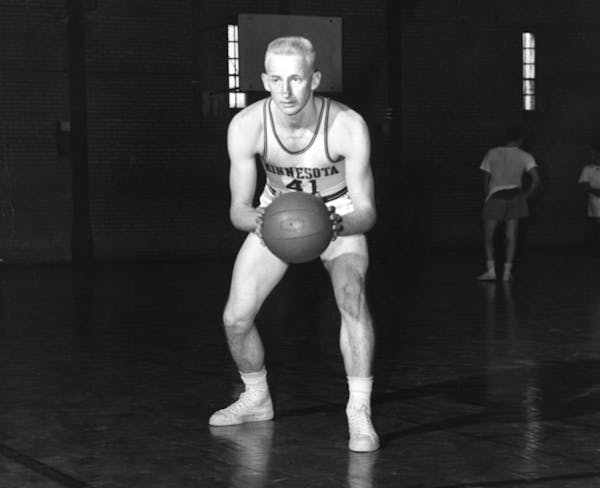The game was on television. I recall that the picture on the small Philco black-and-white screen was very snowy, so perhaps we were trying to pull in the unreliable Ch. 9 signal from Sioux City, Iowa, rather than our one real station, Ch. 11 in Sioux Falls, S.D., but either way, it was a rarity:
A college basketball game important enough to earn a locally produced telecast.
Feb. 28, 1955, a Monday night, and the Gophers were hosting the Iowa Hawkeyes in Williams Arena. The teams were tied for first in the Big Ten at 10-2, and Minnesota already had an 81-80 victory at Iowa City in early January.
The crowd that night was 20,176, at the time the largest ever for a college arena in U.S. basketball. And through that snow, the Gophers' Chuck Mencel scored 27 points, and yet Iowa remained stout, surviving 72-70 to clinch a tie for the Big Ten title.
"They are a fine team," Gophers coach Ozzie Cowles said. "I think they have just a little more than we do, up and down the line."
I might have read that in the next afternoon's Star, with our home delivery of the Minneapolis newspapers 175 miles away in Fulda, in Minnesota's far southwest corner. Or, I might have avoided Dick Gordon's report, sad as I was as a 9-year-old kid over the Gophers' failure to defeat Iowa, even with the great duo of Mencel and Dick Garmaker.
The Star's coverage that afternoon also included a United Press report that the celebration of victory on the University of Iowa campus included police being required to "thwart" an attempted panty raid by an estimated 1,000 male students converging on the main women's dorm.
Different times, indeed.
The Gophers followed with a season-ending home loss to Wisconsin, giving the outright title to Iowa and the Big Ten's champions-only berth in the 24-team NCAA tournament. And old Ozzie, with his bow tie, turned out to be correct, as the Hawkeyes reached the national semifinals before losing to La Salle and Tom Gola.
One advantage for the Hawkeyes was that they were well ahead of their neighbors to the north in integrating athletics. Two of their stars that night were black: Carl Cain and Deacon Davis, previously teammates for the Freeport High Pretzels in Illinois.
This new age of basketball became fully evident 2 ½ weeks later, when the San Francisco Dons became the first team with three black starters — Bill Russell, K.C. Jones and Hal Perry — to win the NCAA championship.
The Gophers were late to such enlightenment. They did not integrate in basketball until Lou Hudson, Don Yates and Archie Clark arrived as freshmen (not then eligible for varsity competition) in the fall of 1962.
As the Final Four returns to be played in a Minneapolis dome for the third time, we can acknowledge our naiveté on this issue, and also let visitors know that in spite of this, Minnesota has been every bit the State of Basketball in widespread interest as it has the "State of Hockey," the notorious branding that has served the awfully named Wild of the NHL so well.
The number of occasions this has happened are countless: You meet a stranger, he asks where you're from, you say, "Minnesota," and the stranger replies, "You must be a hockey fan."
Sometimes, I'll nod. Other times I'll offer this truth: "When and where I grew up, it might as well have been downstate Indiana. Basketball was winter's king; hockey didn't exist."
As it was in Indiana, or Kentucky, or you name it, we had a one-class basketball state tournament that ruled the month of March:
Two weeks of districts, a week of regionals based strictly on geography, and then an eight-team state tournament, with brackets printed in all newspapers, and filled out by 99-point-four-four percent of Minnesotans above the age of reason.
Even my mother's bridge club — all nine of them (eight players and that week's host) would throw in a buck and fret the results. Any loss in Thursday's quarterfinals and your bracket was busted, although we didn't know that term until Dick Vitale and ESPN reinvented college basketball.
There was hockey in the Twin Cities, and Duluth, and on the Iron Range, and in the true hinterlands of northwest Minnesota.
Even Bemidji didn't play hockey until the 1960s. The Lumberjacks had basketball, coach Bun Fortier and nearly annual trips out of Region 8 to the state tournament, and didn't need another winter distraction.
There were four timeless events in Minnesota's fabulous sports year of 1960, and not necessarily in this order.
The American League announced in October that Calvin Griffith's baseball team would be moving to Minnesota; the NFL announced in January that Minnesota would become its 14th franchise in 1961; the Gophers qualified for their first Rose Bowl and were voted as national champions (both in November); and Edgerton won the basketball state tournament in March.
Fulda was in District 8. So was Edgerton. Then Luverne, the perennial district power, became the 1964 state champion, right after Marshall won it in 1963. The Tigers were close enough to be on the schedule once in a while. And then came Sherburn, 60 miles straight east, as the last one-class champion in 1970.
Four champs from farm country in the last 11 winters that we had solo state tournaments filling our ancient Barn.
Here in Minnesota we'll tell visitors that George Mikan and the Minneapolis Lakers won six titles (not the five officially credited by the NBA), and you'll discover we still embrace Bobby Jackson and Clem Haskins' wonderful Final Four team of 1997, even if the record book and NCAA don't agree. And today we can celebrate the greatest wealth of high school talent in this state's history, aided by more far-reaching diversity in our high school programs.
And while Indiana still gets the romantic nods for the 1954 Milan Indians, state one-class champions, enrollment 161, and the inspiration for the Hickory Huskers of "Hoosiers," we have this:
The 1960 Edgerton Flying Dutchmen, enrollment 94, and state one-class champions. Every Minnesotan still around who filled out a bracket can tell you the four Dutchmen who made all-tournament were Dean Verdoes, Dean Veenhof, Darrell Kreun and Leroy Graphenteen.
Well, the fifth starter was Bob Wiarda, and don't you forget it.
Reusse: Gophers volleyball team resets with a legacy setter in the middle of matters
Reusse: Baseball players on the move see Johnnies-Tommies rivalry from both sides

Reusse: Casting Mauer in bronze reminds us of a glittery Twins era that didn't shine enough for some
Reusse: Wolves are kings of unpredictability; that's what makes them so fun


